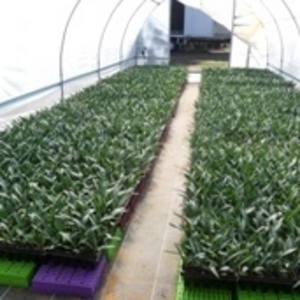Byogy Renewables invests in AusAgave Australia

AusAgave Australia
June 19, 2014
BY Byogy Renewables Inc.
Continuing its commitment to deliver price competitive, 100 percent replacement biofuels and chemicals, Byogy Renewables Inc. has invested in a strategic partnership with AusAgave Australia, as part of the upstream integration of multiple feedstocks to develop low cost sugars for the production of renewable fuels and chemicals.
With feedstock cost representing over 65 percent of fuels final cost, Byogy has launched a dedicated agriculture division with the integration of the AusAgave team. Don Chambers, CEO of AusAgave, joins the Byogy team to drive overall global feedstock operations.
Unlike new oil producing crops currently under study for biofuels, agave has been commercially planted for centuries. Because of its ability to grow in dry climates and poor soil conditions, with very low water and fertilizer demands, agave can be a new global feedstock without displacing any existing food crops, or provoking deforestation.
AusAgave has spent the last ten years developing intellectual property on the drought resistant agave genus by embracing plant propagation, agronomy, cropping, and harvesting techniques which result in plantations affording at least a 50 percent yield per acre improvement over historic sugarcane productivity.
"The results of our recent harvesting program have already proven our efforts to substantially increase sugar yields and decrease delivered sugar costs for select agave species, and we fully expect to continue decreasing sugar costs over the next few years," states Chambers.
Advertisement
Advertisement
AusAgave's recent harvest results already demonstrate the production of low cost sugars allowing Byogy's technology to produce cost competitive Gasoline, Jet Fuel, Diesel, and a suite of Chemicals at or below that of petroleum products without infrastructure modification, blending, or government subsidies.
"Our business plan all along was to vertically integrate technology platforms in an effort to cost effectively develop the complete supply chain. The integration of the AusAgave system may significantly enhance our ability to produce fully renewable, cost competitive fuels and chemicals," said Kevin Weiss, CEO of Byogy.
There will always be a market for fuel ethanol. However, as industries such as aviation, marine, and heavy trucking, which do not use ethanol as a blendstock, take the next steps to secure their own personal energy security and mandated carbon emissions reductions, Byogy's investment in the complete supply chain and in promising feedstock technologies will lead to a cost stable and dedicated long term supply of full replacement fuels for them.
In 2011, Byogy established a subsidiary in Brazil, already the global leader in ground transportation biofuels from sugar, for the development of renewable aviation fuels. Avianca Brasil Airlines has recently partnered with Byogy supporting the advanced global approvals of higher blends of Byogy's premium fuel.
Advertisement
Advertisement
Avianca Flight Operations Director Norberto Raniero states: "Our team now includes more elements to produce a competitive, alternative aviation biofuel."
Raniero adds, "We believe in the quality of Byogy's fuel and are now driving a testing program to possibly achieve greater than 50 percent use in the future. We recognize the importance of ICAO's Carbon Neutral Growth goals, and believe that higher blending, or even full use, of full replacement fuels will be required to make a significant carbon emission reduction impact."
Byogy will now expand its Brazil operations by introducing the AusAgave increased sugar yields of the agave crop, a crop already proven in Brazil for fiber production, to supplement the sugar cane industry to produce drop-in renewable fuels and chemicals from low cost sugars.
With a committed partner in Avianca, the strategic venture with AusAgave represents a significant step in the direction to back a dedicated pledge by Byogy to produce premium quality, and competitively priced biofuels and biochemicals.
Related Stories
The U.S. Department of Energy’s Office of Energy Efficiency and Renewable Energy is soliciting public comments on a preliminary plan for determining provisional emissions rates (PER) for the purposes of the 45Z clean fuel production credit.
On July 17, Iowa’s cost-share Renewable Fuels Infrastructure Program awarded $1.12 million in grants for 20 applicants to add B11 and 4 applicants to add E15 to retail sites. This was the first meeting following the start of RFIP’s fiscal year.
Par Pacific Holdings Inc., Mitsubishi Corp. and ENEOS Corp. on July 21 announced the signing of definitive agreements to establish Hawaii Renewables LLC, a joint venture to produce renewable fuels at Par Pacific’s refinery in Kapolei Hawaii.
A new study published by the ABFA finds that the U.S. EPA’s proposal to cut the RIN by 50% for fuels made from foreign feedstocks, as part of its 2026 and 2027 RVOs, could stall the growth of the biomass-based diesel (BBD) industry.
The U.S Department of Energy Bioenergy Technologies Office, in partnership with the Algae Foundation and NREL, on July 21 announced the grand champion and top four winning teams of the 2023 - 2025 U.S. DOE AlgaePrize Competition.
Upcoming Events










